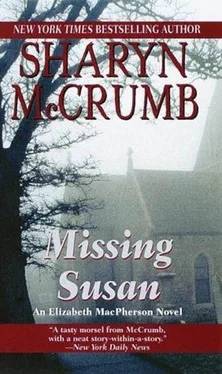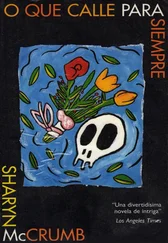Sharyn McCrumb - Missing Susan
Здесь есть возможность читать онлайн «Sharyn McCrumb - Missing Susan» весь текст электронной книги совершенно бесплатно (целиком полную версию без сокращений). В некоторых случаях можно слушать аудио, скачать через торрент в формате fb2 и присутствует краткое содержание. Жанр: Детектив, на английском языке. Описание произведения, (предисловие) а так же отзывы посетителей доступны на портале библиотеки ЛибКат.
- Название:Missing Susan
- Автор:
- Жанр:
- Год:неизвестен
- ISBN:нет данных
- Рейтинг книги:3 / 5. Голосов: 1
-
Избранное:Добавить в избранное
- Отзывы:
-
Ваша оценка:
- 60
- 1
- 2
- 3
- 4
- 5
Missing Susan: краткое содержание, описание и аннотация
Предлагаем к чтению аннотацию, описание, краткое содержание или предисловие (зависит от того, что написал сам автор книги «Missing Susan»). Если вы не нашли необходимую информацию о книге — напишите в комментариях, мы постараемся отыскать её.
Missing Susan — читать онлайн бесплатно полную книгу (весь текст) целиком
Ниже представлен текст книги, разбитый по страницам. Система сохранения места последней прочитанной страницы, позволяет с удобством читать онлайн бесплатно книгу «Missing Susan», без необходимости каждый раз заново искать на чём Вы остановились. Поставьте закладку, и сможете в любой момент перейти на страницу, на которой закончили чтение.
Интервал:
Закладка:
Elizabeth frowned. “Go on. How does she say she did it?”
Rowan adjusted his glasses and began to read in carefully measured tones. “ ‘ A few days before the murder she obtained possession of a razor from the green case in her father’s wardrobe, and secreted it. This was the sole instrument which she used. She also secreted a candle with matches, by placing them in the corner of the closet in the garden, where the murder was committed.’ ”
Elizabeth looked up sharply. “It was not!” she declared. “The police investigation said that the child was smothered in his own bed! The throat-cutting was postmortem. Why should she lie about that?”
“Why indeed,” murmured Rowan. “Let us continue. ‘ On the night of the murder she undressed herself and went to bed, because she expected that her sisters would visit her room. She lay awake, watching, until she thought that the household were all asleep, and soon after midnight she left her bedroom and went downstairs and opened the drawing room door and the window shutters.’ ”
“How very premeditated!” said Elizabeth sarcastically. “Why, there’s mafia hit men who are less thorough than that. And this is a sixteen-year-old planning to kill a baby for no particular reason. Sure!”
Without comment, Rowan resumed the narrative. “ ‘ She then went up into the nursery, withdrew the blanket from between the sheet and the counterpane, and placed it on the side of the cot. She then took the child from his bed and carried him downstairs through the drawing room.’ ”
Elizabeth interrupted again. “What about the suffocation?”
“She seems unaware of that detail, doesn’t she? Where was I?- ‘Having the child in one arm, she raised the drawing room window with the other hand, went round the house and into the closet, lighted the candle and placed it on the seat of the closet, the child being wrapped in the blanket and still sleeping, and while the child was in this position, she inflicted the wound in his throat. She says that she thought the blood would never come-’”
“It wouldn’t if he was already dead,” said Elizabeth. She looked thoughtful. “But she says nothing of having smothered him in his bed.”
“No,” Rowan agreed, “in fact, she says that the child was not killed, so she thrust the razor into its left side, and put the body, with the blanket round it, into the vault.”
“What?” cried Elizabeth. “She claims that she stabbed Savile with the razor? I’d like to have seen her try that!”
“Yes, it is hard to stab someone with the blunt tip of a straight razor, isn’t it? Slashing, yes. But puncture wound? No, I wouldn’t have thought so.”
“Well, this is rubbish,” Elizabeth declared. “If I were going to confess to a crime, I believe I’d endeavor to know more about the circumstances than this poor girl did.”
“Perhaps she was doing her best,” Rowan pointed out. “Some of it may even be true. If the child had been killed in the nursery, she could have carried him down as she described and inflicted the postmortem injuries to divert suspicion from the household. And I suppose that such an act might prey on her young mind as much as an actual murder.”
Elizabeth was silent for a few minutes, contemplating the evidence. “She had no reason to lie,” she said at last. “If she was admitting to murder, she might as well tell how it really happened. Since she got it wrong, we can assume that it was because she didn’t know what actually occurred on the night of the murder. She was taking the blame for somebody else.” She sighed. “You’re right, Rowan. Your version is the only one that makes sense. Daddy is fooling around with the nursemaid, when the child wakes up and starts to cry. In trying to hush the boy, Mr. Kent accidentally smothers him, and then-perhaps with Constance’s help-he takes the child to the privy and cuts its throat to make the killing look like an outside job. Constance may be guilty as an accessory after the fact, but she didn’t kill the child. Why didn’t the authorities realize it at the time?”
“It was an unsolved case of four years’ standing,” Rowan reminded her. “I don’t suppose they wanted to look a gift horse in the mouth. I myself think that there was a certain amount of religious hysteria involved in her confession. Since the crime, Constance had been living at Brighton in a religious institution, and it was to the minister in charge that she first confessed. Why not? The crime had blighted her life anyway. What marriage prospects would she have with her family under perpetual suspicion of butchery? And what else could she hope for in that era? Not a job as a governess, surely?” He smiled at the absurdity of it.
Elizabeth took back the crime book and turned to the end of the chapter. “What happened to Constance? It says here that at her trial she was condemned to death, but that sentence was commuted to life imprisonment. I wonder how Mr. Kent felt about that.”
“A regrettable but necessary sacrifice,” said Rowan, in his best imitation of a Victorian patriarch.
“She served twenty years, then was released from prison. Oh, damn! This book says that no one is certain what became of her after that. That’s not fair! I want to know.” She looked suspiciously at the guide. “You know, don’t you?”
Rowan shook his head. “No, but I suspect that the answer is known these days. Scholars of Victorian crimes are like bloodhounds, and that’s just the sort of puzzle that would send them off baying through the courthouses on three continents.”
“I don’t have time to do that,” said Elizabeth, frowning.
“Here,” said Rowan. “Give me one of those mawkish postcards you’re always buying. Yes, that one of Glastonbury will do.” He pulled out his fountain pen and wrote on the back in his nearly legible scrawl: Please send information on final whereabouts of Constance Kent to Dr. Elizabeth MacPherson, c/o Mountbatten Hotel, Seven Dials, London. He addressed the card to Kenneth O’Connor in Yorkshire. “There,” he said cheerfully. “That will give you something to look forward to at journey’s end. Kenneth will know the answer to this, if anyone does.”
“Last night as sad I chanced to stray ,
The village death-bell smote my ear ,
Thy winking aside and seemed to say
‘Countess, prepare-thy end is near.’ ”
– TRADITIONAL ENGLISH BALLAD
on the death of Amy Robsart
CHAPTER 14

OXFORD
THE GROUP SPENT one night at Ruthin Castle in North Wales, where they attended the regular Friday night medieval banquet, learning to eat soup with their fingers and gaining a new appreciation for the beauty of Welsh singing. Since they had to leave at ten the next morning (“Before the shops even opened!”), they were unable to form much of an opinion of Wales. Frances noted that bad carpeting seemed to be endemic among the ancient castles of Britain, but otherwise the company found it a pleasant and picturesque place. It did not have the aura of a thirteenth-century castle, though. Centuries of renovations probably accounted for that. It seemed no older nor more impressive than Moretonhampstead, nine hundred years its junior.
Rowan Rover, who was not well-versed in Welsh law, decided to refrain from any questionable activity until the party again crossed the border into England.
Another long drive on Saturday took them south again, with a stop to tour Powys Castle, and finally to the Shropshire town of Shrewsbury, where Frances would at last walk in the footsteps of the fictional Brother Cadfael. Rowan Rover had the weekend off, as was his custom, and he bade them farewell at the train station, promising to see them Monday morning for the journey to Oxford.
Читать дальшеИнтервал:
Закладка:
Похожие книги на «Missing Susan»
Представляем Вашему вниманию похожие книги на «Missing Susan» списком для выбора. Мы отобрали схожую по названию и смыслу литературу в надежде предоставить читателям больше вариантов отыскать новые, интересные, ещё непрочитанные произведения.
Обсуждение, отзывы о книге «Missing Susan» и просто собственные мнения читателей. Оставьте ваши комментарии, напишите, что Вы думаете о произведении, его смысле или главных героях. Укажите что конкретно понравилось, а что нет, и почему Вы так считаете.












